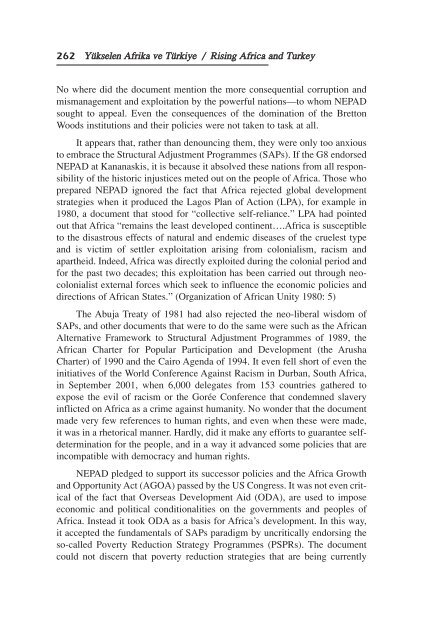EN - FR - Yükselen Afrika ve Türkiye / Rising Africa and Turkey 3
EN - FR - Yükselen Afrika ve Türkiye / Rising Africa and Turkey 3
EN - FR - Yükselen Afrika ve Türkiye / Rising Africa and Turkey 3
Create successful ePaper yourself
Turn your PDF publications into a flip-book with our unique Google optimized e-Paper software.
262 Yükselen <strong>Afrika</strong> <strong>ve</strong> Türkiye / <strong>Rising</strong> <strong>Africa</strong> <strong>and</strong> <strong>Turkey</strong>No where did the document mention the more consequential corruption <strong>and</strong>mismanagement <strong>and</strong> exploitation by the powerful nations—to whom NEPADsought to appeal. E<strong>ve</strong>n the consequences of the domination of the BrettonWoods institutions <strong>and</strong> their policies were not taken to task at all.It appears that, rather than denouncing them, they were only too anxiousto embrace the Structural Adjustment Programmes (SAPs). If the G8 endorsedNEPAD at Kananaskis, it is because it absol<strong>ve</strong>d these nations from all responsibilityof the historic injustices meted out on the people of <strong>Africa</strong>. Those whoprepared NEPAD ignored the fact that <strong>Africa</strong> rejected global de<strong>ve</strong>lopmentstrategies when it produced the Lagos Plan of Action (LPA), for example in1980, a document that stood for “collecti<strong>ve</strong> self-reliance.” LPA had pointedout that <strong>Africa</strong> “remains the least de<strong>ve</strong>loped continent….<strong>Africa</strong> is susceptibleto the disastrous effects of natural <strong>and</strong> endemic diseases of the cruelest type<strong>and</strong> is victim of settler exploitation arising from colonialism, racism <strong>and</strong>apartheid. Indeed, <strong>Africa</strong> was directly exploited during the colonial period <strong>and</strong>for the past two decades; this exploitation has been carried out through neocolonialistexternal forces which seek to influence the economic policies <strong>and</strong>directions of <strong>Africa</strong>n States.” (Organization of <strong>Africa</strong>n Unity 1980: 5)The Abuja Treaty of 1981 had also rejected the neo-liberal wisdom ofSAPs, <strong>and</strong> other documents that were to do the same were such as the <strong>Africa</strong>nAlternati<strong>ve</strong> Framework to Structural Adjustment Programmes of 1989, the<strong>Africa</strong>n Charter for Popular Participation <strong>and</strong> De<strong>ve</strong>lopment (the ArushaCharter) of 1990 <strong>and</strong> the Cairo Agenda of 1994. It e<strong>ve</strong>n fell short of e<strong>ve</strong>n theinitiati<strong>ve</strong>s of the World Conference Against Racism in Durban, South <strong>Africa</strong>,in September 2001, when 6,000 delegates from 153 countries gathered toexpose the evil of racism or the Gorée Conference that condemned sla<strong>ve</strong>ryinflicted on <strong>Africa</strong> as a crime against humanity. No wonder that the documentmade <strong>ve</strong>ry few references to human rights, <strong>and</strong> e<strong>ve</strong>n when these were made,it was in a rhetorical manner. Hardly, did it make any efforts to guarantee selfdeterminationfor the people, <strong>and</strong> in a way it advanced some policies that areincompatible with democracy <strong>and</strong> human rights.NEPAD pledged to support its successor policies <strong>and</strong> the <strong>Africa</strong> Growth<strong>and</strong> Opportunity Act (AGOA) passed by the US Congress. It was not e<strong>ve</strong>n criticalof the fact that O<strong>ve</strong>rseas De<strong>ve</strong>lopment Aid (ODA), are used to imposeeconomic <strong>and</strong> political conditionalities on the go<strong>ve</strong>rnments <strong>and</strong> peoples of<strong>Africa</strong>. Instead it took ODA as a basis for <strong>Africa</strong>’s de<strong>ve</strong>lopment. In this way,it accepted the fundamentals of SAPs paradigm by uncritically endorsing theso-called Po<strong>ve</strong>rty Reduction Strategy Programmes (PSPRs). The documentcould not discern that po<strong>ve</strong>rty reduction strategies that are being currently





